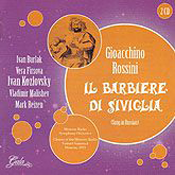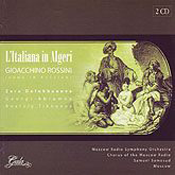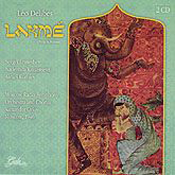
20 Jan 2008
Historic opera performances in Russian on Gala
Once the custom of the world's opera houses was to translate great operas into the language of each respective country.
The Gran Teatre del Liceu in Barcelona, after suffering a calamitous fire in the early 1990s, reopened in 1999, lovingly restored. TDK has released a series of DVDs from the Liceu since that date, providing ample evidence of the world...
Premiered posthumously, the symphonic song-cycle Das Lied von der Erde by Gustav Mahler (1860-1911) remains one of his defining works because of its synthesis of song and symphony, two genres he pursued throughout his career.
In 1851 during his first season as music director in Düsseldorf, Robert Schumann presented a performance of Bach’s St. John Passion, and unsurprisingly adapted the score both to nineteenth-century taste and nineteenth-century practicalities.
The centrality of dance at the French court helped bring grace, order, and political allegory into the characteristic prominence they enjoyed during the reigns of Louis XIV and Louis XV; theatre presentations of all stripes were infused with choreographic diversions.
In tandem with the recently released set of Sir Simon Rattle’s recordings of Mahler’s symphonies on EMI Classics, the set of the complete symphonies by Jean Sibelius merits attention.
As much as Richard Wagner espoused opera reform in his theoretical writings by bringing to his works for the stage a closer unity between music and text, his actual means of doing so at times involved the use of orchestral forces that sometimes overwhelmed the sung word.
The budget label Gala purveys live performances both historic and relatively recent; of the three discussed here, the La Scala Fedora dates back to 1931, while the Attila comes from a 1987 La Fenice performance.
National styles of music in the seventeenth century were often distinctive, and in the case of French and Italian music, famously so.
With its recent release of Mahler’s symphonies conducted by Sir Simon Rattle, EMI Classics makes available in a single place an outstanding contribution to the composer’s discography.
This DVD records and commemorates a 1981 production of Parsifal in its Bayreuth lair, and the singers of 1981 are as fine as recollection might paint them.
Repackaging older recordings having become the primary focus of a classical recording company's business, Deutsche Grammophon budgeted some funds for art direction for its budget series called "Opera House" (although that appellation only appears in a link found on the back inside cover of the sets' booklets).
Of Rosenkavaliers on DVD, the classics tend to be lovingly detailed productions, going back to the film of Herbert von Karajan leading an exemplary cast, with Elizabeth Schwarzkopf's iconic Marschallin.
Despite an unsurprising degree of conservatism in liturgical music, devotional life in Rome often found ways of taking advantage of modern musical style.
“Her fioritura is priceless, breathtaking, and effortless.”
The English composer Nicholas Maw has been a major voice since the 1960's, with a wide range of works that include the 2002 opera, "Sophie’s Choice," a violin concerto for Joshua Bell (1993), and the monumentally-scaled orchestral work, "Odyssey" (1972-87).
As is often the case, last works that remain incomplete at the time of a composer’s death, are quick to invoke controversy and conspiracy theories.
This is a valuable new recording of a work that is only rarely heard, but was widely influential and wildly popular during the eighteenth century. Philosophe Jean-Jacques Rousseau wrote both the libretto and the music, with mixed success.
This disc is well worth the price for the first track alone: the opening measures of Jean-Féry Rebel’s “Cahos,” (Chaos), written in 1737 or 1738, may cause you to wonder if you accidentally left a Stockhausen or Ligeti disc in the changer.
This recording made half a century ago will not be anyone’s first choice unless one is a die-hard fan of one of the principal singers; neither of them belonging to the absolute top in their profession.
Why should anyone buy a German language broadcast of a delicious French opéra-comique?

Once the custom of the world's opera houses was to translate great operas into the language of each respective country.
Perhaps this trend died away with the greater ease of jet travel, or in a recoil from the ultra-nationalism which produced devastating wars. It certainly took a long time for Germany to begin offering, say, Verdi in Italian.
The trade-off is imperfect, however, as most singers sound their best singing in languages they are truly comfortable with. And what greater comfort than one's mother tongue? So three recent Gala releases of mid-twentieth century radio performances from Moscow of Italian and French repertory sung in Russian may at first seem like mere curiosities. Actually listening, however, may develop converts to the older style. Though initially the sharp, brusque sound of Russian may seem all wrong for Rossini or Delibes, the great singers captured here know their roles, and though these are not live performances, the sense of immediacy is palpable.
All the sets find room for extra tracks dedicated to one significant performer in each opera. Unsurprisingly, the Il Barbiere di Siviglia, recorded in 1953, focuses on the estimable tenor Ivan Kozlovsky. Besides his Almaviva in the opera, we also get on disc two his Gounod Romeo and in a particularly rare treat, a vocal version of Tchaikovsky dramatic overture to the Shakespeare tragedy, both sung with Yelisaveta Shumskaya's Juliet. Kozlovsky, in his early 50s at the time of the recording, retains his amazing upward extension, and ample evidence of that comes early in "Ecco ridente." Although all the recordings have decent sound, the hollow acoustic of the radio studio doesn't allow the tenor's tone to bloom, and it isn't always pleasing. But his technique still prompts respect.
The Figaro, Ivan Burlak, sings a rough but enjoyable "Largo al factotum." Vera Firsova's Rosina won't develop easily into the mopey countess of Mozart's Nozze. Her feisty, yet sweet, voice made your reviewer think of a Russian Victoria de los Angeles. In the singing lesson she performs a strong "Bel raggio lusinghier" from Semiramide. The great bass Mark Reizen growls humorously in a delightful "La Calumnia." The booklet essay, by the way, only provides biographies of Kozlovsky and Reizen, along with a brief synopsis of the plot and a few lines on the opera's premiere. Track listings for all three sets discussed in this review appear in the libretto's original language.
 Both the Barbiere and the L'Italiana in Algeri feature a clunky piano to accompany the recitatives. Although the cast is less familiar, the L'Italiana comes across as just as fun. Gala's chosen focus here is Zara Dolukhanova, with the entire booklet essay providing information on her career. In the bonus tracks, she offers a darker but still passionate Rosina for "Una voce poco fa." Two strong excerpts from Semiramide suggest that if the complete performance exists, it should be released. Her Russian version of Meyerbeer's "Nobles seigneurs salut!" from Les Huguenots confirms what her Isabella in the main performance demonstrated: she could move that creamy voice as smoothly and quickly as required. Her supporting cast delivers solid performances, with the tenor, identified as "A. Nikitin," being overshadowed by his counterparts on the other sets.
Both the Barbiere and the L'Italiana in Algeri feature a clunky piano to accompany the recitatives. Although the cast is less familiar, the L'Italiana comes across as just as fun. Gala's chosen focus here is Zara Dolukhanova, with the entire booklet essay providing information on her career. In the bonus tracks, she offers a darker but still passionate Rosina for "Una voce poco fa." Two strong excerpts from Semiramide suggest that if the complete performance exists, it should be released. Her Russian version of Meyerbeer's "Nobles seigneurs salut!" from Les Huguenots confirms what her Isabella in the main performance demonstrated: she could move that creamy voice as smoothly and quickly as required. Her supporting cast delivers solid performances, with the tenor, identified as "A. Nikitin," being overshadowed by his counterparts on the other sets.
 The third set leaves Rossini for Delibes's Lakme. The famous duet, "Viens, Malika," goes at a surprisingly snappy pace for Nadezhda Kazantseva, singing the title role, and Anna Maliuta. Kazantseva doesn't sparkle as some sopranos have done in the "Air des clochettes," though she has the notes. By the end of the set, a lack of variety in her tone has taken some of the exotic charm from her Lakme. Gala's choice for the spotlight here is the Gerard, tenor Sergei Lemeshev. He has more honey in his voice than Kozlovsky, but less individuality. The bonus tracks have sharper sound than the just adequate 1946 recording of the Delibes opera. Lemeshev's slight vibrato is loosening a bit in these tracks, though he sings a touching "Elle ne croyait pas" from Thomas's Mignon.
The third set leaves Rossini for Delibes's Lakme. The famous duet, "Viens, Malika," goes at a surprisingly snappy pace for Nadezhda Kazantseva, singing the title role, and Anna Maliuta. Kazantseva doesn't sparkle as some sopranos have done in the "Air des clochettes," though she has the notes. By the end of the set, a lack of variety in her tone has taken some of the exotic charm from her Lakme. Gala's choice for the spotlight here is the Gerard, tenor Sergei Lemeshev. He has more honey in his voice than Kozlovsky, but less individuality. The bonus tracks have sharper sound than the just adequate 1946 recording of the Delibes opera. Lemeshev's slight vibrato is loosening a bit in these tracks, though he sings a touching "Elle ne croyait pas" from Thomas's Mignon.
Considering the modest price Gala charges for its amply-filled sets, lovers of opera who want to explore the riches of a lost world of traditional opera performance should look for these sets. And Gala would do well to issue more, if more are to be found.
Chris Mullins